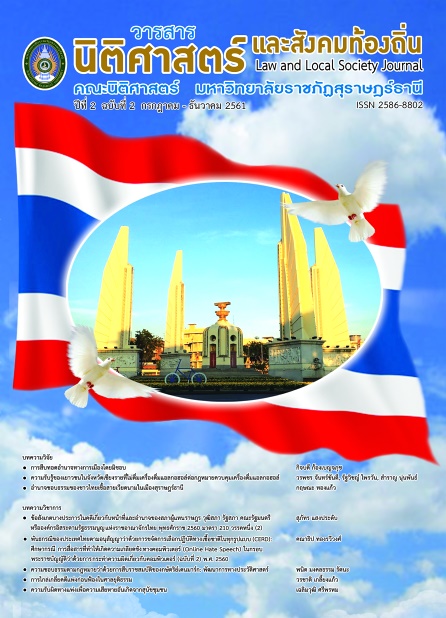Legitimate power of Vietnamese Thais in Suratthani Town
Keywords:
legitimate power, Vietnamese Thais, Suratthani TownAbstract
This paper aims to investigate the legitimate power of the Vietnamese Thais people in Suratthani Town. Qualitative methodology was implemented in the study with the documentary researches, in-depth interviews of 9 case studies and 1 group interview under the discussion topic of although Suratthani Town is a new town and far away from Mekong River, the Vietnamese Thais still has potentially established the legitimate power by themselves.
The results found that the legitimate power of the Vietnamese Thais was identified into three types. The first type was charismatic authority which was formed through Vietnamese’s working behaviors in cluding diligence, providence, honesty and tolerance. The Vietnamese-Thai have conducted occupations such as refrigerator mechanic for over 40 years, tailors for over 20 years, and traditional treatment as a Vietnamese physician, until they received acceptance from local people. The second type was traditional authority which was established through culture of Vietnamese foods and the preservation of Vietnamese language. In Suratthani, there was a person who received the decoration from Vietnamese government due to his effort to preserve the traditional language. The last type is rationality legal authority which was given by Thai government as a representative of Vietnamese people in Thailand in order to coordinate between government agencies and the Vietnamese. For instance, some Vietnamese Thais had chance to work in the provincial hospital as the volunteer, while some of them worked as the probation volunteer at the Suratthani Probation Office.
According to such case, the rationality legal authority could be compared to the ideal for developing youths and peoples in society so that they could follow the right path and maintain their legitimacy.
References
2. Coser, L. A.. (2004). Masters of Sociological Thoughts. Bangkok: Vithitath Publisher.
3. Donsom, J. (2008).The ethnic identity construction of the Vietnamese Thai in BanNaJok. KhonKaen: KhonKaen University.
4. Khuntalay Self-help Community Office. Khuntalay Self-help Community. Document. Suratthani.
5. Poole. (1970). The Vietnamese in Thailand A Historical Perspective. Inthaca and London: Cornell University.
6. Sripana Trinh Dieu Thin. (2005). Viet Kieu in ThailandinThai-Vietnamese relationship. Bangkok: Chulalongkorn University.
7. Thongkaew, K and Others. (2014, July). Viet kieu : Family mobility based on the motherland shrine. Journal of Humanities and Social SciencesSuratthani Rajabhat University, 6(2).
8. Thongkaew, K and Others. (2014, September). Legitimate Power and Authority in Social Mobility of Vietnamese Thai. Journal of Mekong Societies, 10(3).
9. Thongkaew. K and Others. (2016, November) Conditions Affecting Social Mobility of the Vietnamese Family in Thai Society. TheSocial Sciences. 11(3).
10. Thongrungroj, J. (2017). English-Thai Dictionary of Sociology. Bangkok: Saengdown.
11. Tosakul R. (2005). Concept of Power. Bangkok: National Research Council of Thailand.
List of interviewees
1. Interview Ting Dung Kwuang. 1 May 2017.
2. Interview Eian NguyenThi. 6 May 2016.
3. Interview Eian NguyenThi, Kanitta Janekamthorn, jae Weewan. 7 May 2016.
4. Interview Uthai Tokong. 6 May 2017.
5. Interview Kanitta Janekamthorn. 6 May 2017.
6. Interview Payon Lewan. 6 May 2017.
7. Interview Kawee Panwan. 29 April 2017.
8. Interview Tham Leviet. 1 May 2017.
Downloads
Published
How to Cite
Issue
Section
License
Articles published are copyright of local law and society journals. Faculty of Law Surat Thani Rajabhat University
Content and information in articles published in local law and society journals It is the opinion and responsibility of the author of the article directly. which the journal editor It is not necessary to agree or share any responsibility for articles, information, content, images, etc. published in local law and society journals. It is the copyright of the local jurisprudence journal. If any person or entity wants to distribute all or part of it or to take any action must have prior written permission from the local jurisprudence journal only.


